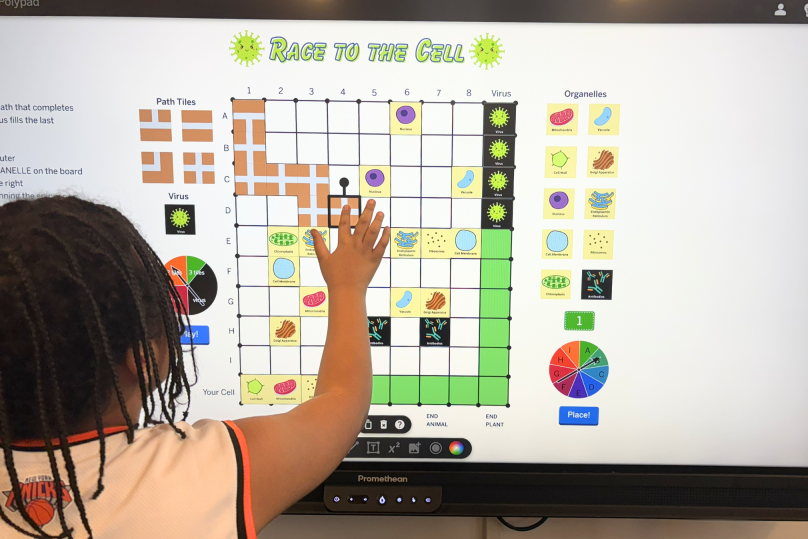
MƒA Master Teacher Kate Litman brings game-based learning to new levels in her classroom and beyond.
Kate Litman recalls a moment in 2021 when she was playing the popular matching card game Spot It! with her two young children. “I remember thinking, how does this game work where you can lose a card and it doesn't break the game?” Litman says. “Because the bane of my existence as a math teacher is having decks of 52 cards where you lose a card and then it's ruined. It's so frustrating.”
Litman had been interested in game-based learning for around a decade by then, ever since she started teaching at Quest to Learn, a grade 6-12 school in Manhattan with an educational philosophy developed by educators and game theorists at the New York-based non-profit organization The Institute of Play. She had even created her own games, including a set-making mathematics game she called “The Whole Enchilada.”
"In middle school, especially in math, kids hearing that they’re wrong can feel frustrating or even shameful, which can cause them to shut down or stop trying,” Litman says. “[Games] enable kids to experiment and imagine without the fear of judgement — and that can be incredibly powerful.”
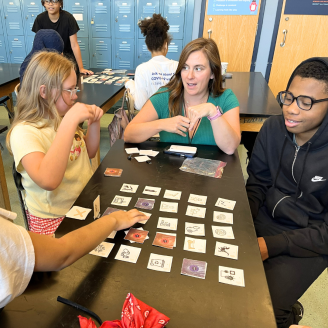
Through her research, Litman discovered that Spot It! was based on the concept of finite projective planes, where every two distinct points in a geometric structure determine a unique line, and every two lines intersect at a unique point. With each card in Spot It! representing a line, and each image representing a point, the math dictates that any two given cards will have exactly one image in common.
Litman realized she could design and build a Spot It!-inspired learning game by using categories of images, rather than identical matches. “You can literally use this premise for any subject,” she says. After making one for her son, then in kindergarten, featuring pictures of objects that began with the same letter sound, she went on to create games for both mathematics and science classes, incorporating equations, vocabulary and other concepts.
In the fall of 2021, Litman shared her ideas with her MƒA colleagues in a “Spot It! Game Design” workshop. She went on to co-facilitate a minicourse that incorporated both Spot It! and another game, Codenames, which ran twice during the next school year. Participants in the course played the educational version of the games that Litman had devised, then began designing their own.
“Every teacher chose at least one game to prototype and by the third session teachers were actively playtesting each others’ games,” Litman says. “We created shared drives where teachers could download and share games across schools and content.”
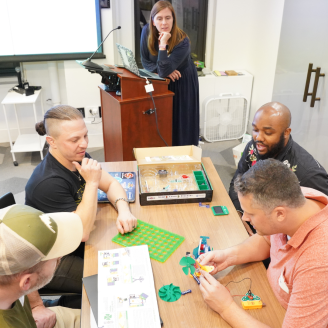
Litman was encouraged by the positive feedback she received from her colleagues who took the course, and the joy and inspiration she saw them experiencing firsthand. “The biggest reward from facilitating an MƒA course is the knowledge that teachers are taking ideas back into the classroom and implementing these practices more widely,” she says.
At MƒA, Litman has also explored game-based learning through the Thursday Think Speaker Series, including such speakers like Dr. Mandë Holford, co-founder of the educational technology company Killer Snails; and Australian teacher and YouTuber Eddie Woo, whom Litman was invited to introduce. “Game-based learning has become part of my identity, and I bring it to most of my MƒA activities,” Litman says.
In addition to her work within MƒA, Litman has created game-based learning professional development opportunities at her own school and beyond. During a teaching sabbatical, she began hosting an ongoing series of workshops at New Design High School, an art- and design-focused high school on the Lower East Side. The collaboration led Litman to create a Google Sheets database of educational games, including printables and live web links to games, which she has shared with hundreds of educators.
“The biggest reward from facilitating an MƒA course is the knowledge that teachers are taking ideas back into the classroom and implementing these practices more widely... MƒA is such a consistent support for teachers trying innovative techniques."
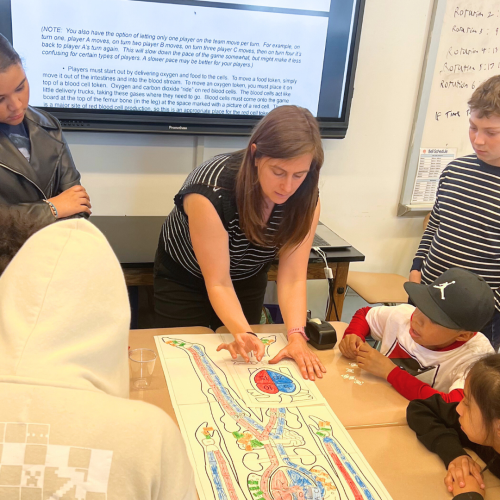
Kate playing a circulation game with her 6th grade students.
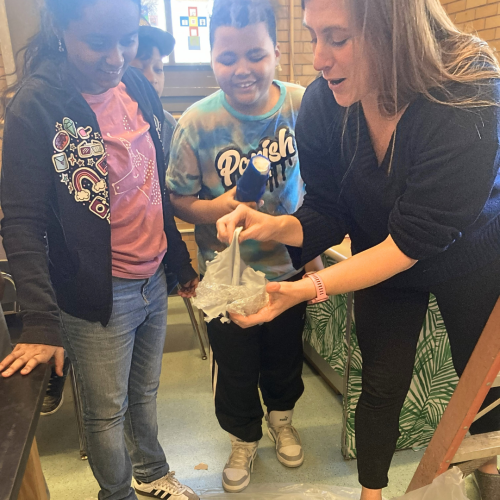
Kate conducting an egg drop design challenge with her 6th grade students.
Through her own LLC, Playful PD, Litman hopes to expand her professional development offering to schools and educators beyond New York City. She frequently uses Desmos, a free online platform for creating and sharing interactive math and science activities, as well as Polypad, a collection of interactive digital manipulatives designed for teachers and students.
Over Litman’s extensive history with game-based learning, she has seen improving technology make it possible for her to put more and more of her ideas into practice. Similarly, she appreciates MƒA’s commitment to supporting game-based learning and providing a collaborative space for teachers seeking to exchange ideas about it.
“A lot of times as a teacher, ideas will take a long time to germinate, and sometimes you have to be patient,” Litman says. “Budgets and time and attention ebb and flow, but MƒA is such a consistent support for teachers trying innovative techniques.”